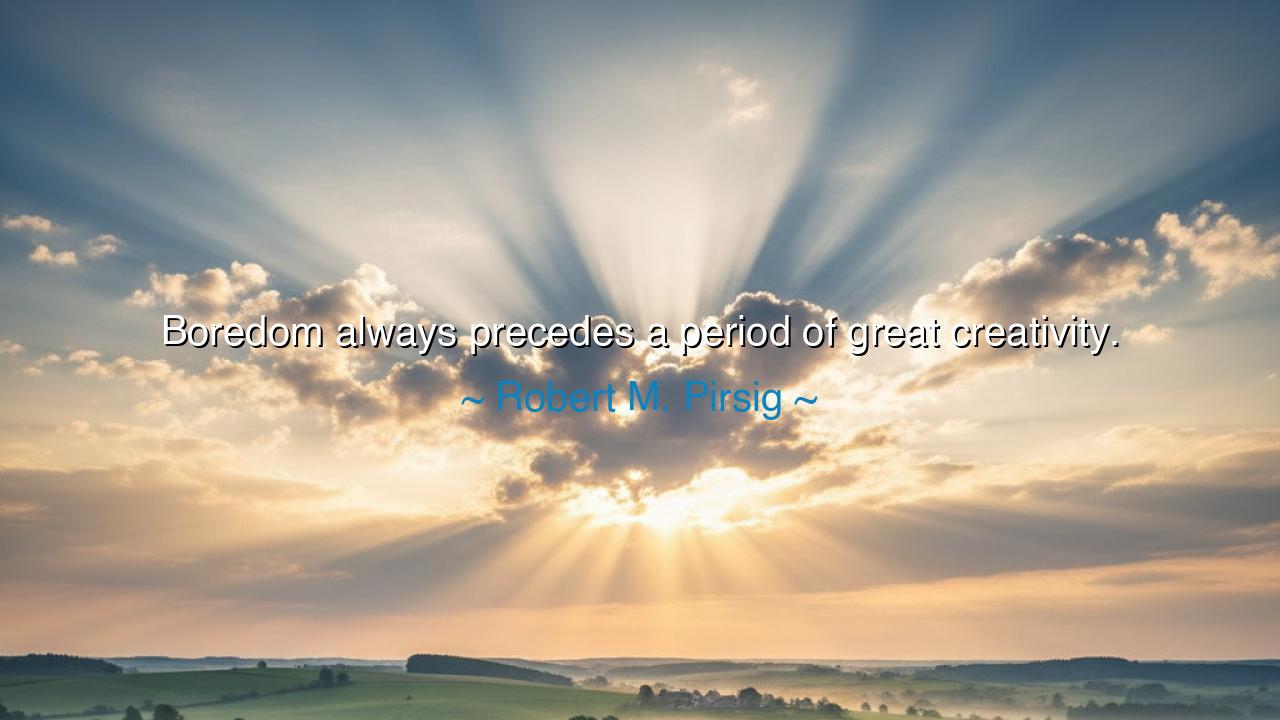
Boredom always precedes a period of great creativity.






In the deep chambers of reflection, Robert M. Pirsig, philosopher and author of Zen and the Art of Motorcycle Maintenance, once wrote: “Boredom always precedes a period of great creativity.” These words, though simple in sound, contain a wisdom as old as human thought itself. For they remind us that the mind, before it gives birth to something wondrous, must first pass through the stillness of emptiness. Boredom, that quiet unease which so many flee from, is not the death of imagination — it is its gestation. It is the fertile silence before the song, the fallow field before the harvest.
In our age, we treat boredom as an enemy. We reach for distraction, for noise, for endless motion to escape its quiet presence. But the ancients knew better. They understood that idleness and solitude are the midwives of vision. When the world grows silent and the mind grows restless, something begins to stir beneath the surface — a spark of creation, waiting to be born. Pirsig’s insight calls us to embrace that moment, to see in boredom not a void, but a threshold — the space where old thoughts fall away and new ones begin to form.
Consider the story of Isaac Newton, who, during the Great Plague of 1665, was sent away from Cambridge to live alone in the countryside. The universities were closed, and the city was silent. Newton was, by all accounts, bored — cut off from society, from lectures, from the rhythm of academic life. Yet in that solitude, wandering beneath the apple trees and staring into the empty sky, he conceived the laws of motion, the theory of gravity, and the foundations of modern physics. What seemed like isolation became the cradle of genius. It was in boredom that his mind turned inward — and found the universe.
This is the hidden law that Pirsig reveals: that creation is born not from constant stimulation, but from quiet contemplation. When the river of experience runs dry, the mind begins to dig deeper into its own bedrock. The artist, the thinker, the inventor — all must pass through this desert before finding their oasis. Even the poet Rainer Maria Rilke spoke of this truth when he wrote, “If your daily life seems poor, do not blame it; blame yourself, tell yourself that you are not poet enough to call forth its riches.” He knew that boredom is not emptiness but invitation — a test of how deeply we can see, how far we can reach within ourselves.
There is, in truth, a kind of alchemy in boredom. It transforms frustration into reflection, restlessness into revelation. It strips away distraction and forces the spirit to listen. Many of the greatest works of art and philosophy were conceived not in moments of excitement, but in the long hours of stillness — when nothing seemed to happen, yet everything was quietly becoming. It is the same with nature: the seed lies dormant in the dark earth before breaking into bloom. So too must the mind rest in stillness before awakening into creativity.
But beware, my children, for the power of boredom lies in how one meets it. Those who flee from it, who fill their silence with endless noise, shall never touch the deeper currents of their own soul. Yet those who endure it, who sit in the stillness without fear, will find that boredom is not an enemy, but a teacher. It teaches patience, focus, and the art of listening to the unseen. It is the forge where inspiration is tempered into mastery.
The lesson, therefore, is sacred: do not fear stillness, do not despise boredom. When you find yourself in the empty hours, when the world grows quiet and your thoughts seem to circle without purpose, know that you stand on the edge of creation. Instead of seeking escape, lean into that quiet. Walk, write, dream, or simply breathe. Let the silence do its work upon you. For as Robert M. Pirsig teaches, boredom is not the absence of creativity — it is its womb.
So, when next you feel the dull ache of monotony pressing upon your heart, smile gently and remember: this, too, is preparation. The mind must grow weary of the familiar before it dares to imagine the new. The soul must grow restless before it learns to fly. Be patient, therefore, with your stillness, and honor your boredom as the ancient poets honored the dawn — for soon, out of that silence, something beautiful will awaken, and it will bear your name.






AAdministratorAdministrator
Welcome, honored guests. Please leave a comment, we will respond soon